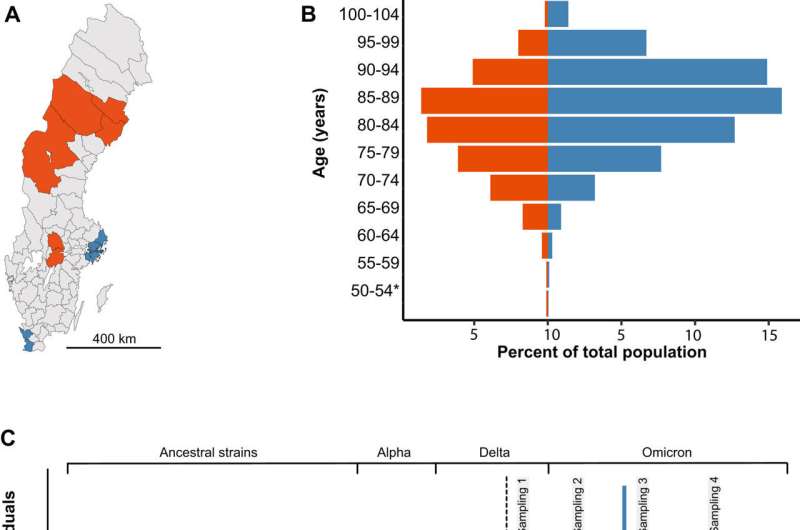This article has been reviewed according to Science X's editorial process and policies. Editors have highlighted the following attributes while ensuring the content's credibility:
fact-checked
trusted source
proofread
Elderly with few antibodies may need an extra dose of COVID-19 vaccine: Study

The new mRNA vaccines have just as good a protective effect against COVID-19 for the very oldest as for younger people. This is evident in a study at Umeå University, where researchers have followed individuals in special housing around Sweden. However, the study shows that elderly people with a low antibody response after vaccination were at increased risk of dying from the omicron variants of the disease. The research is published in The Lancet Regional Health—Europe.
"The result suggests that we should be able to identify in advance which people have the greatest risk of being seriously affected and may need extra efforts in the form of, for example, additional vaccine doses," says Linnea Vikström, Ph.D. student at the Department of Clinical Microbiology at Umeå University and joint first author of the study.
Starting in September 2021, the researchers followed 114 different special housing units with a total of just over 3,000 people in Skåne, Stockholm, Örebro, Jämtland-Härjedalen and Västerbotten Counties. Finger prick blood sampleswere taken every three months from the residents and compared with data on illness and death. The average age in special housing for the elderly is 86 years.
96-fold increase
By October 2021, almost all residents had received the third dose of the COVID vaccine. The researchers could then see a 96-fold increase in the amount of antibodies in the blood. The fourth dose in March 2022 only gave a fourfold increase in the antibodies, which can be explained by the fact that the level was already high then. The researchers were also able to establish that the amount of antibodies was largely the same for people over and under 65 years of age. This suggests that the mRNA vaccines given in doses three and four worked just as well for the elderly as for the younger.
The researchers continued with studies on a smaller group of how vaccination protects against the different omicron variants of COVID-19. With supplementary blood samples, the ability of the antibodies to neutralize the virus variants was analyzed. It was then possible to see that the antibodies did not protect against contracting the disease in themselves. In contrast, the antibodies greatly reduced the risk of dying from the disease.
Higher mortality
People with lower levels of antibodies had increased mortality within 30 days of infection. When the researchers performed statistical analyses on test results of all the elderly who participated in the study, they saw that the people with the ten percent lowest levels of antibodies in their blood were three to four times as likely to die within 30 days of being diagnosed with the virus.
The lower level of antibodies in some elderly people is probably related to the fact that there may be individual differences in how different people's immune systems react to vaccines.
"The study can help us and other researchers understand how the different variants of the virus get past the immune system among the elderly and how the vaccine needs to be developed to protect against serious illness and death," says Linnea Vikström.
More information: Linnea Vikström et al, Vaccine-induced correlate of protection against fatal COVID-19 in older and frail adults during waves of neutralization-resistant variants of concern: an observational study, The Lancet Regional Health—Europe (2023). DOI: 10.1016/j.lanepe.2023.100646




















